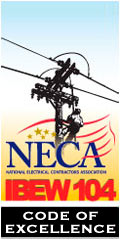NEPPA eNewsletter
December 2013
EXECUTIVE DIRECTOR'S REPORT
|
On November 12, the NEPPA Regional Power Supply Committee met at NEPPA’s Training Center. For those not in attendance, it was a very informative meeting and highlighted how fortunate NEPPA is to have such knowledgeable and dedicated volunteers. Thirty-five members participated either in person or via phone. Chairperson Steve Kaminski (New Hampshire Electric Coop) put together a strong agenda on NEPOOL/ISO issues.
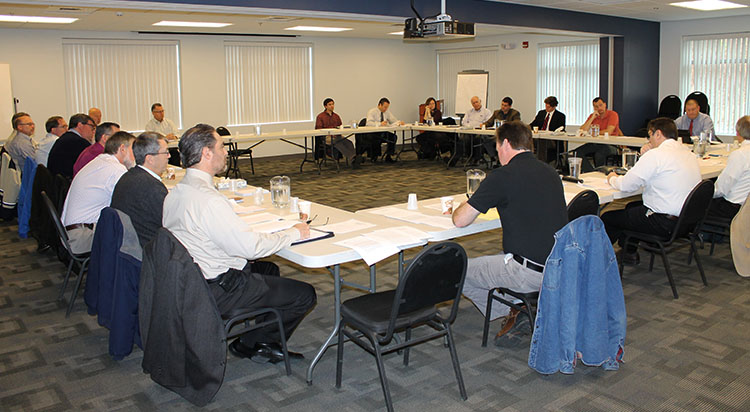 Brian Forshaw of CMEEC did an outstanding job of updating the attendees on:
Discussed in the meeting was the letter issued by ISO/New England on November 9, 2013. Still a relative newbie to the power industry, I have to acknowledge that as I get a better understanding on the market that was created, it is clearer and clearer that it violates most of the basic rules for market construction.
It doesn't appear that ISO started out with many of its defects. In my opinion, the original market construct was based on flawed and oversimplified theory. But, like many bureaucratic designs, it is too difficult for the creators and managers to acknowledge a bad premise. So what happens? They acquiesce to demands of those attempting to gain on the market and then begin tinkering to try and make the model viable.
After years of maneuvering the forward capacity market, the spot market and all of the other components that comprise the New England energy market, the only thing that has been accomplished is a dramatic difference in the have and have not’s. Public power is one of the have not’s in this scenario.
In September, a delegation from NEPPA went down to Washington, D.C., and when meeting with legislative staff we suggested that a "holistic approach" be used to overhaul ISO New England. It is impractical to expect FERC to accept that ISO New England should be dissolved and an unadulterated market model put in place. But, if the existing model is going to survive and not drain the consumers of New England, a market analysis from outside experts should be conducted and changes implemented to restore a natural market.
The one comment that sticks with me is one made by an ISO New England staffer at at of their programs. When asked why the market allows the speculators, it was stated that "the market isn't’t viable without them." Shouldn't a market at its base be functional prior to allowing speculators to enter?
Feel free to enlighten me, if I have oversimplified the issue.
In January, be on the lookout for the announcement about NEPPA’s new website. Also, NEPPA will be experimenting with distance learning in 2014 and hopes to simulcast some of our in-person training to members in remote locations. Please let me or members of the Education and Training Committee know if you have any suggestions for programs that should allow for remote access.
I wish you happy and safe holidays on behalf of the NEPPA leaders and staff.
##SHARELINKS##
|
AROUND NEW ENGLAND
|
On November 14, 2013 Wellesley Municipal Light Plant hosted a luncheon for their entire staff to celebrate 1,000 consecutive days without a lost-time accident – an achievement they are very proud of. Each staff member was given a WMLP thermos and a check as a token of the Board’s appreciation of their commitment to safety in their work environment. They were joined by the Mass Development/Devens Utility from Devens, MA and three members of the Wellesley Municipal Light Plant board, Jack Stewart (Chairman), Owen Dugan, and Paul Criswell.
Richard Joyce, the General Manager at WMLP, goes on to say, "everyone throughout the WMLP is proud of achieving 1,000 consecutive days without a lost time accident. Obviously, as our primary safety instructors, the wonderful staff at NEPPA contributed immensely to this accomplishment."
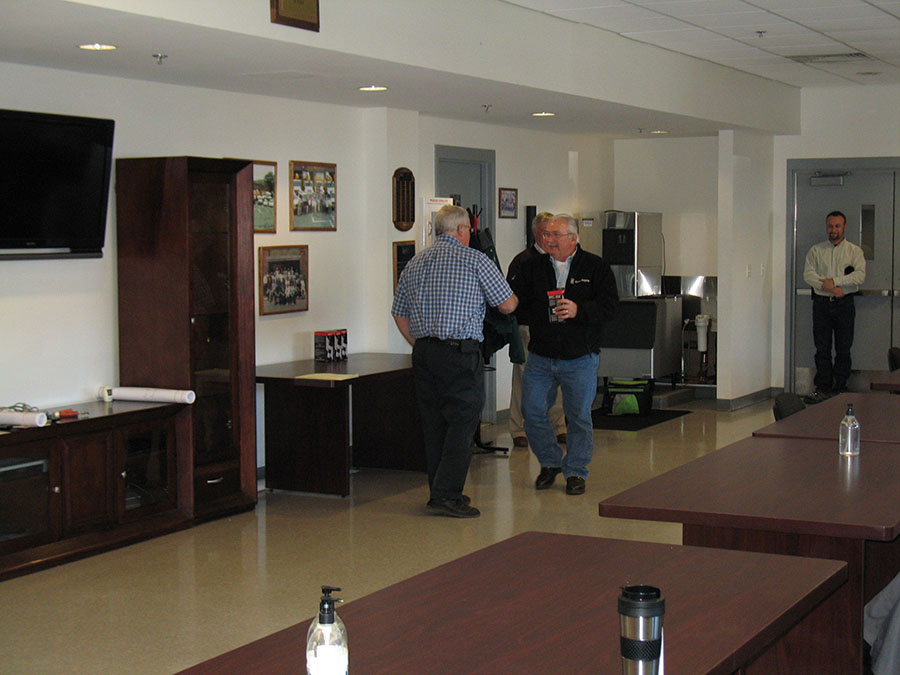 Donald Newell recognizing Bob Henrickson for his safety training efforts at the WMLP. 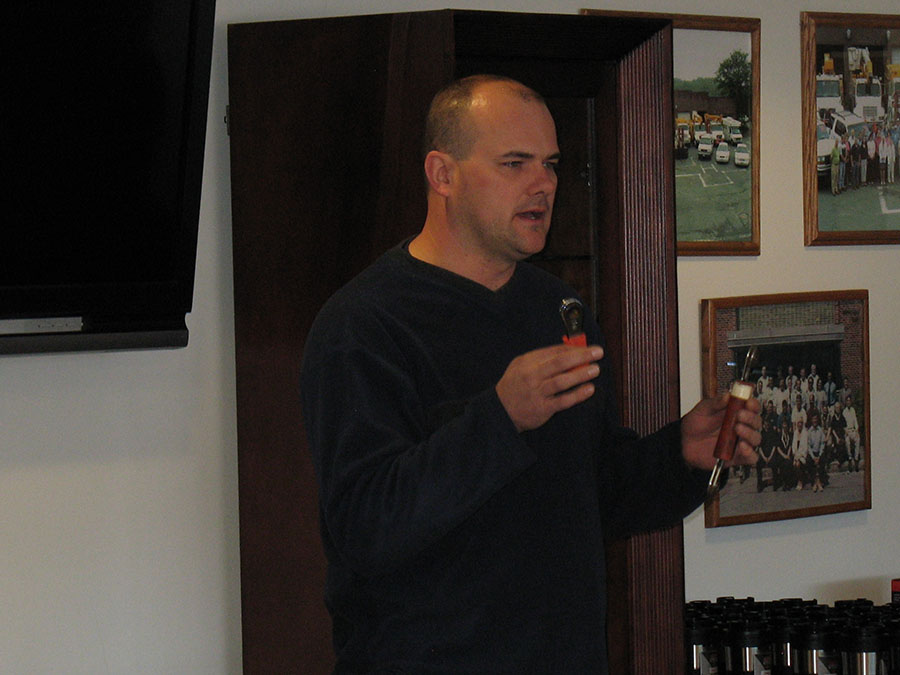 Crew Leader Dennis Furbush speaking about safety. 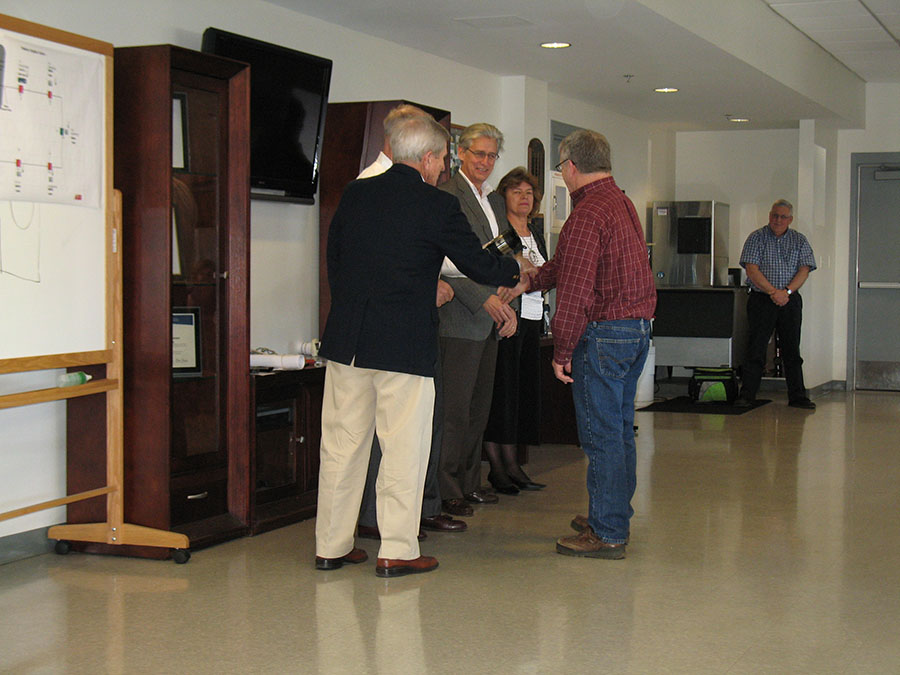 Lineman Bob Ryan receiving recognition from MLP Board Members (left to right) Owen Dugan, Jack Stewart (Chairman), and Paul Criswell. 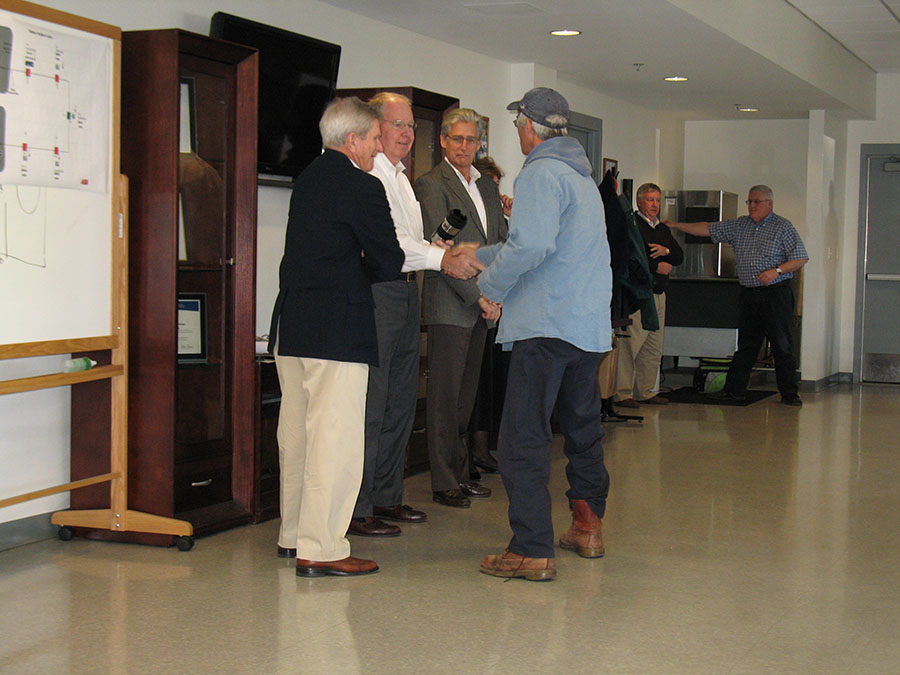 Jim Verner receiving recognition from MLP Board Members (left to right) Owen Dugan, Jack Stewart (Chairman), and Paul Criswell. ##SHARELINKS##
|
|
Braintree, MA – Braintree Electric Light Department (BELD) has launched a new Customer|Connect electricity usage portal, giving customers access to all their electric usage details online.
"Customer|Connect is easy to use and remarkably sophisticated," said Gail Cohen, Manager of Support Services at BELD. "We expect that, by presenting consumption data to our customers on a near-real time basis, Customer|Connect will create a powerful connection for our customers between energy consumed and money spent."
BELD’s new electricity usage portal displays the data gathered by recently installed advanced meters. Customers can go to beld.com/Electric/CustomerConnect.asp to view their usage so they can see how everyday habits affect hourly consumption and ultimately, monthly electric bills. Customer|Connect provides a fast, easy way to monitor all electric usage – right down to the hour.
As its usage becomes more widespread, Customer|Connect will help BELD’s 16,000 commercial and residential customers access their consumption histories to manage their resources via the web or mobile devices and make smarter decisions about energy use.
"BELD wants to help customers learn how to conserve energy ... and dollars!" Cohen added. "We hope that every BELD customer will want to use Customer|Connect and learn about our other energy-saving programs."
For more than 110 years, Braintree Electric Light Department has been a nonprofit public power utility owned and operated by the citizens of Braintree. BELD Broadband has offered high-speed Internet since 1998, cable television since 2000 and phone service since 2007.
##SHARELINKS##
|
|
Each year, APPA presents two prestigious awards that recognize outstanding utilities that embody the spirit of the Demonstration of Energy & Efficiency Developments (DEED) program. These awards are an opportunity to impress your customers, community and industry colleagues with your utility’s accomplishments. The two awards being given are: Award of Continued Excellence (ACE) The Award of Continued Excellence recognizes a DEED member utility that has demonstrated continued commitment to the DEED program and its ideals. Nominations are evaluated on involvement in the DEED program (i.e. grants, scholarships, etc.), commitment to energy-efficiency; investigation/use of renewable resources; and support of public power. This award is presented during APPA's annual Engineering and Operations Technical Conference. Energy Innovator Award (EIA)
The Energy Innovator Award recognizes utility programs that have demonstrated advances in the development or application of creative, energy-efficient techniques or technologies, provide better service to electric customers or projects that increase the efficiency of utility operations or resource efficiency. Judging criteria also includes transferability and takes into account project scope in relation to utility size. This award is presented during APPA's annual National Conference. The deadline for submission for both awards is January 31, 2014. ##SHARELINKS##
|
ASSOCIATION HAPPENINGS
|
NEPPA held its Annual Membership Meeting on November 1, 2013 at the Westford Regency Inn & Conference Center in Westford, MA. The meeting was well attended by members of the Northeast Public Power Association, including utilities and affiliates from all around New England.
The meeting began with Barbara Grimes, NEPPA’s President, welcoming the group and gave her President’s Report. Afterwards, Kristin DiGirolamo, NEPPA’s Controller, presented the 2014 Association Budget. Next, Larry Brownell, NEPPA’s Executive Director, delivered the 2014 Business Plan for NEPPA.
Following that, the affiliates who had elected to do so, had the chance to stand up in front of the group and share what their companies do and what they can offer the utilities.
The following people stood up to represent their companies:
Our guest speaker was Joan Vennochi from the Boston Globe. She delivered what she believes to be the political outlook for 2014, which was well received and sparked many questions. Afterwards, everyone had lunch and visited with the affiliates who had booths in the back of the room.
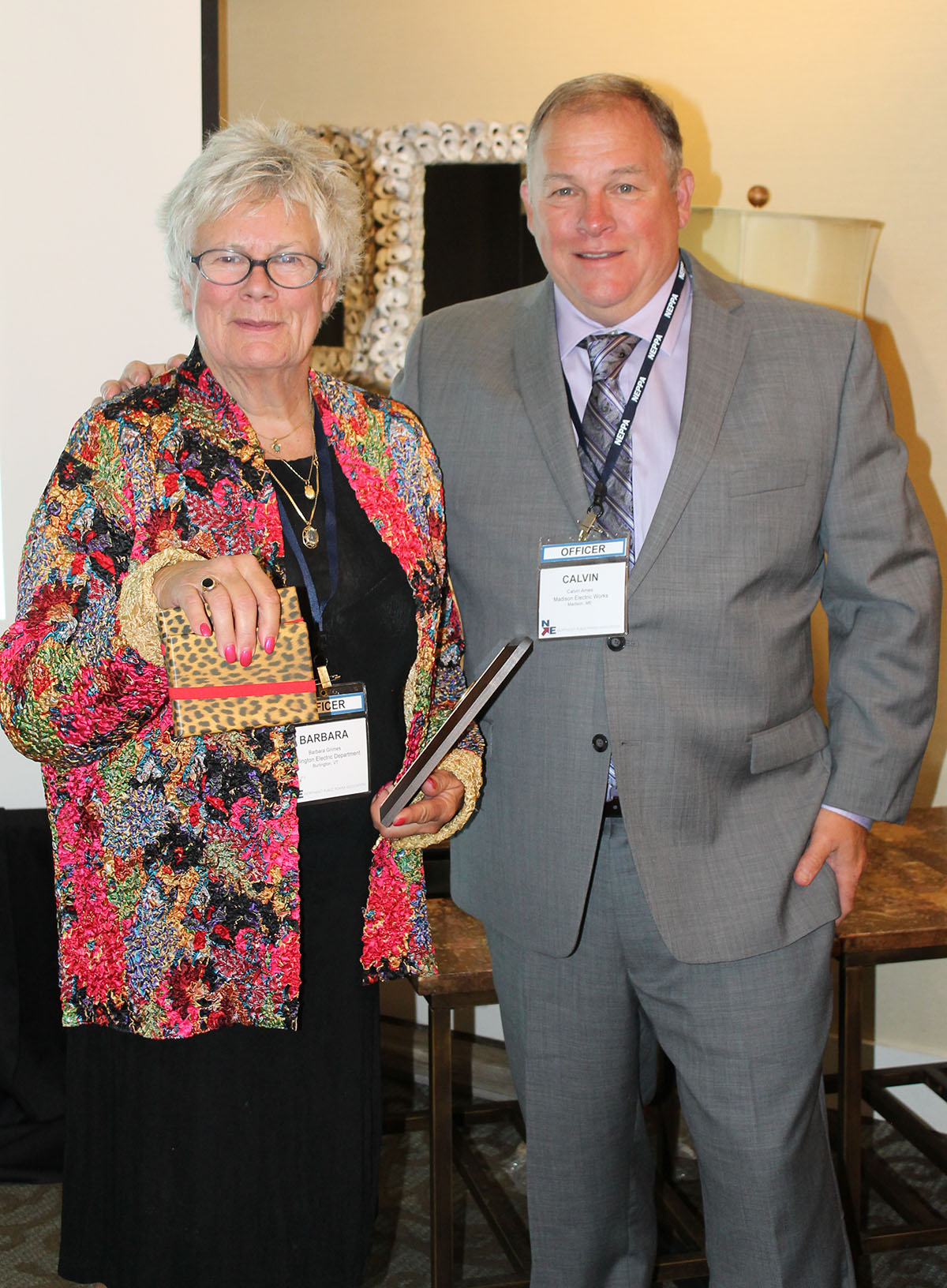  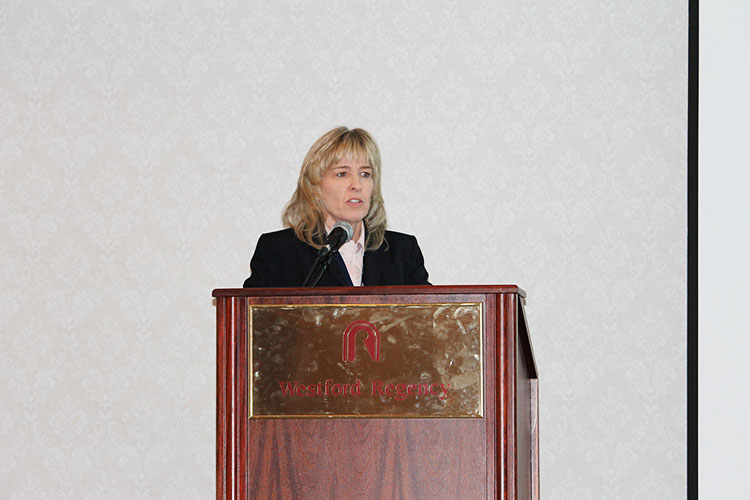  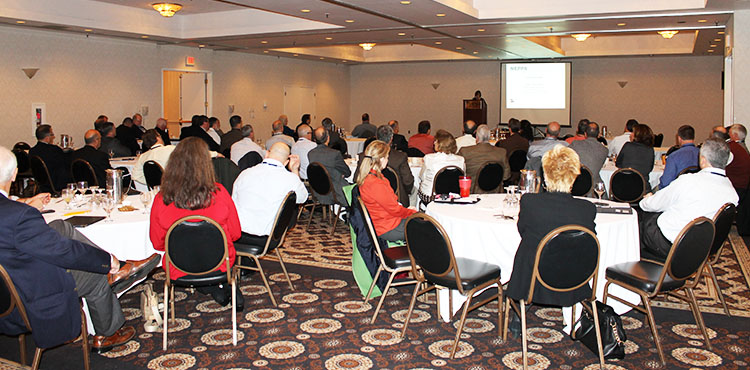 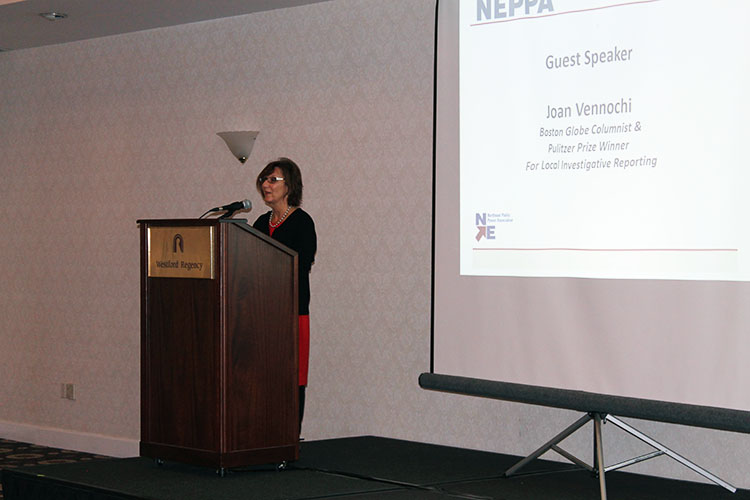 ##SHARELINKS##
|
|
The 2013 Customer Service Leadership Program wrapped up its final session this past month on November 13, 2013. This year’s program had 25 graduates representing utilities from Massachusetts, New Hampshire and Maine. Rockie Blunt, who was the instructor, has been with NEPPA for five years on a regular basis but has offered customer service training in a variety of industries for the past 20 years. This was the third time Rockie conducted this program for NEPPA.
There were three sessions prior to the final session, which all took place at the Littleton Training Center on the following dates:
"The program went exceptionally well," said NEPPA trainer Rockie Blunt. "Even though there were months between sessions, every time we got together, the discussion picked up just where it had left off in the previous meeting. Everyone identified their challenges, shared success stories and offered advice for handling difficult situations. The discussions were honest, enthusiastic and compassionate. It was a true team experience."
The following is a list of the graduates and what utility they were from:
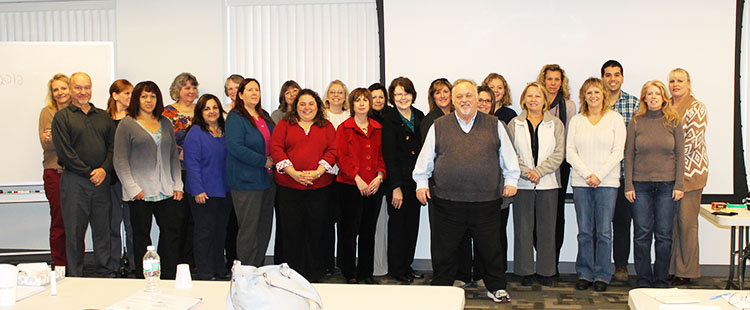 ##SHARELINKS##
|
|
NEPPA just concluded the semi-annual Public Utility Management Program. The fall curriculum included great sessions on power purchasing, customer generation, public relations, legal and financial management. The program, started more than 20 years ago by Pat Hyland, is designed for lighting board members, general managers and staff moving into management functions of public utilities. It touches on all of the elements related to operating a public utility. The program is designed so that attending two consecutive programs will produce a solid 360 degree look at the industry.
Since the program is focused on interacting with the expert speakers, the attendance is limited to a maximum of 20 attendees each session. This session, four of the 14 attendees completed their second session; they are pictured here at the commencement ceremony.
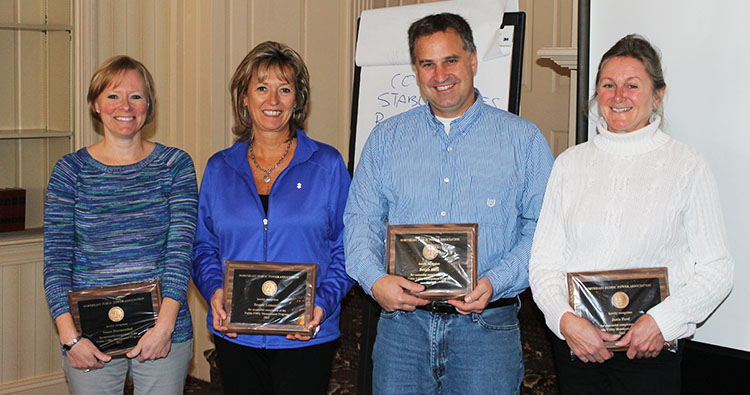 Those completing the program from left to right: Susan Blumenthal (Westfield), Bonnie Lemanski (Chicopee), Dennis Ahlin (Peabody) and Janice Ford (Hull). The program is a great continuing education resource for managers and board members to keep abreast of the current trends in the industry. This fall’s educators included speakers from BerryDunn, Jackson Jackson & Wagner, MMWEC, PURMA, and Rubin and Rudman LLP.
Should you, your staff or lighting commissioners have attended? Here is a simple test. Are you comfortable with your answers to these following questions?
The last one is easy. Attend the PUMP program with them! This gives you the opportunity to give your commissioner the knowledge they need about the industry and for you to discuss your individual utility’s unique circumstances.
At the conclusion of this fall’s program, the question emerged if we have outgrown the name, "PUMP." Should we change the name to PULP (Public Utility Leadership Program)? This would better categorize the information and interactions that are occurring. Keep an eye out as we ponder this question.
The good news is that either way, NEPPA will continue providing this valuable service to our members. In January, we will announce the April dates for the spring program. We anticipate that we will return to the Water’s Edge in Westbrook, CT. If you are interested, register early, to ensure you do not fall outside our capacity cut off.
Thank you to all of our fall speakers and attendees for making the program such a success.
##SHARELINKS##
|
|
NEPPA, the quality leader for public power education in the Northeast, is seeking a new full time instructor for its Littleton, MA, Training Center and other remote training sessions.
NEPPA offers competitive compensation and a positive environment. Candidates must have crew experience and be proficient in operational/technical and safety areas of public utility operations and must be comfortable with public speaking and group management. NEPPA will train the right candidate in our programs. For information or to apply, please contact either Steve Socoby, ssocoby@neppa.org, or Larry Brownell, lbrownell@neppa.org, or call 978-540-2200.
##SHARELINKS##
|
CALENDAR
|
August 24-27, Sea Crest Beach Resort, Falmouth, MA
Sea Crest Beach Hotel provides a new look and personality that is light and airy, with a playful atmosphere and staff. Just minutes over the Bourne or Sagamore bridges, the Sea Crest Beach Hotel provides an alluring backdrop for a peaceful Cape Cod escape. Slip on your flip-flops, bring the beach towel, and allow us to help you re-learn the art of relaxation.
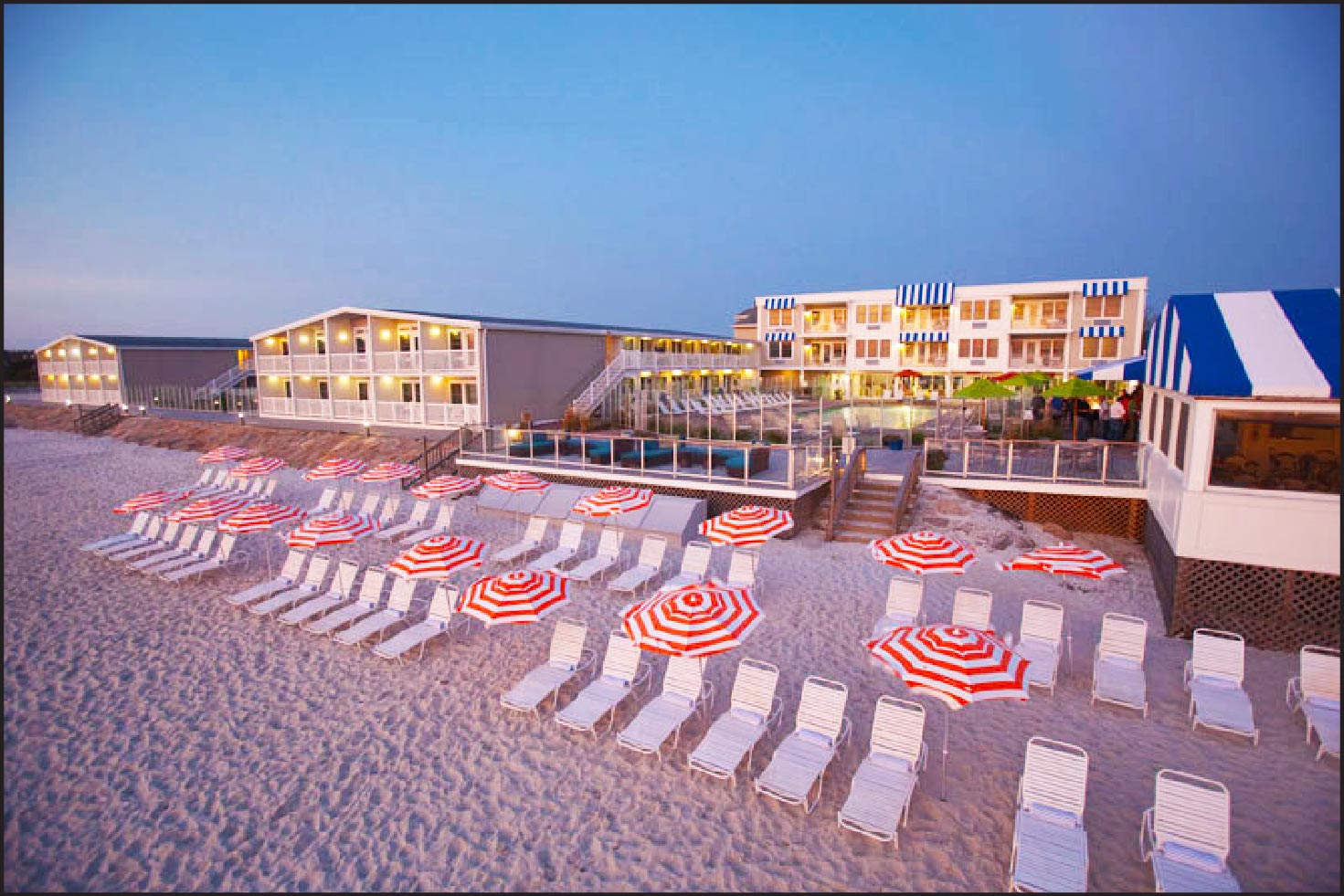 ##SHARELINKS##
|
EDUCATION & TRAINING UPDATE
|
On October 24, 10 New York State lineworker fourth year apprentices received their certificates of completion from the Northeast Public Power Association and the NorthWest Lineman's College at the Fairport, New York training center.
The group fulfilled the necessary requirements from Bill Hesson, a NEPPA training consultant, completing class room academic studies and performing such necessary skills as climbing, installing PPE, rigging line hardware and equipment including hot sticking methods.
The group was led by three outstanding students that all achieved final averages of 98.8:
Kyle Butler, Andrew Zess, Dave Suydam, Jeff Schindler, Marcus Lukins, Joseph DeGennaro, Tommy Ballard, Jim Saffin, Timothy Welch and Kevin Winship. 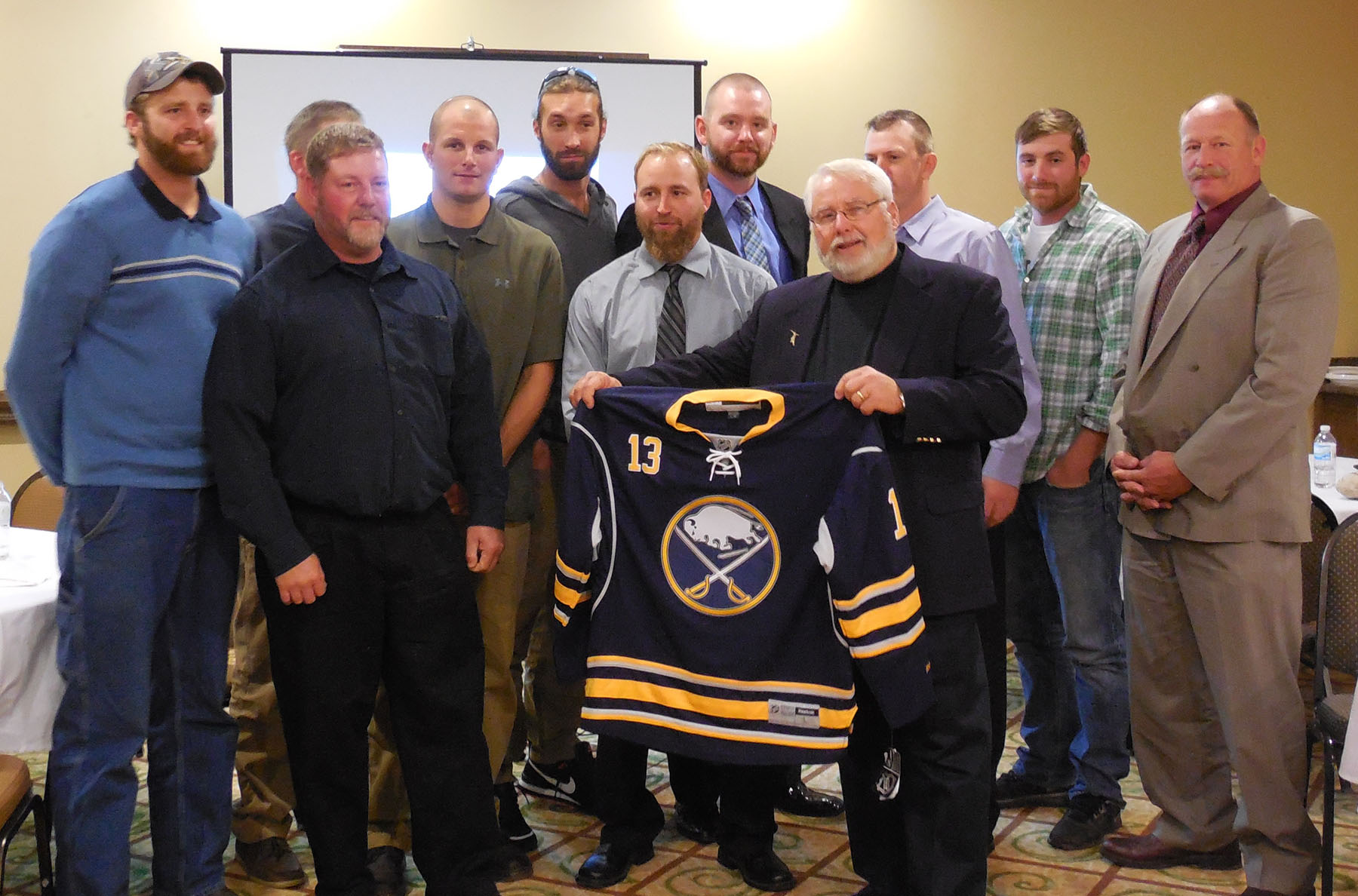 ##SHARELINKS##
|
|
On November 12, the NEPPA Safety Trainers assembled in Littleton, MA, for their annual meeting. Each year, the trainers meet to discuss important issues they all face and any regulation updates that need to be shared to help ensure that all training sessions are current with related regulations. Techniques that make training sessions both interesting and relevant are also shared.
As in past years, the group discussed many important topics. One subject was the APPA Safety Manual and new additions and changes that have come about. The group has been united in opposing any regulation, rule or work procedure in any form that could possibly result (in the opinion of the group) in an unsafe condition for electrical line workers. This year, it was agreed that one such rule should be opposed. That rule allows line workers to work on more than one energized phase at a time on the same pole as long as those workers were in separate insulated buckets. The trainers were unanimous in opposing this allowance and recommend that all line workers adhere to the age old rule of working on only one energized phase at a time. It was also agreed that any safety manuals are to be looked upon as the minimum level of safety required and that a more stringent rule or work procedure is not only allowable but might often be desirable.
In addition, the group welcomed two new trainers added since last year’s meeting. Dave McAlpine and Shaun Oparowski were in attendance for the first time. They both gained insight from the experiences that were shared by the veteran trainers, Bob Henriksen, Bill Hesson, Lou Gabriele and Linda Calderiso. The time spent sharing experiences and difficulties and methods of resolving problems were invaluable for all. Unfortunately, John Jankowski was unable to join us this year.
All of NEPPA’s trainers recommitted themselves to conduct the highest quality training possible recognizing the importance of training line workers to work in the safest manner possible. As an organization, NEPPA is truly fortunate to have such a dedicated team of people who take their job seriously and carry the burden to not only inform each crew of the regulations involved with their work but also to motivate those crew members to put into action the safe work procedures necessary to ensure that "Everyone goes home to their families at the end of the work day, the same way that they came to work that morning ... safe and sound!"
Steve Socoby
NEPPA Director of Training
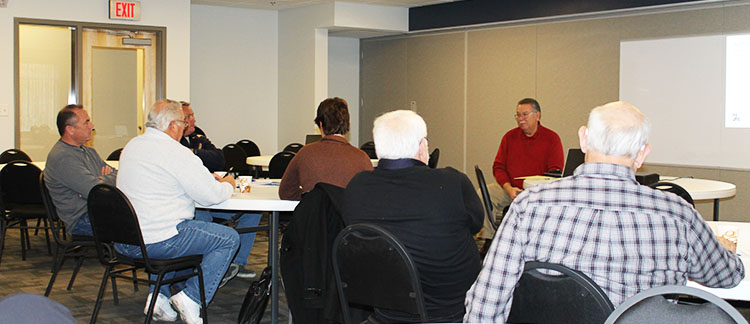 ##SHARELINKS##
|
|
On November 22, the Class of 2014 Northeast Public Power Association Apprentice School left the Training Facility for a field trip hosted by Hendrix Wire and Cable, Molded Products Division in Amherst, NH. The day was spent learning how the Hendrix spacers, insulators and other molded products are manufactured. The Molded Products Di vision recently moved from the original Hendrix location in Milford, NH, to the new building in Amherst. The new facility is a clean and very efficiently run operation which uses robotics in the manufacture of most of the molded products. The tour guides did an excellent job answering all of the questions posed by the class. It was a very informative day and as always, it was great to see "Made in the USA" stamped proudly on each box. We would like to thank Robin Jowders and all the folks at Hendrix for their hospitality.
Robin Jowders, who hosted this visit, went on to say, "Hendrix has participated in the NEPPA Apprentice Lineman Course for several years. It's been a pleasure to host this group of students at our facilities in Milford and Amherst, NH. The folks that come through these classes have shown significant interest in our products and the proper installation and application methods. There's always a wide array of great questions and more importantly, terrific feedback. We have learned a lot from these groups and look forward to the next class visit."
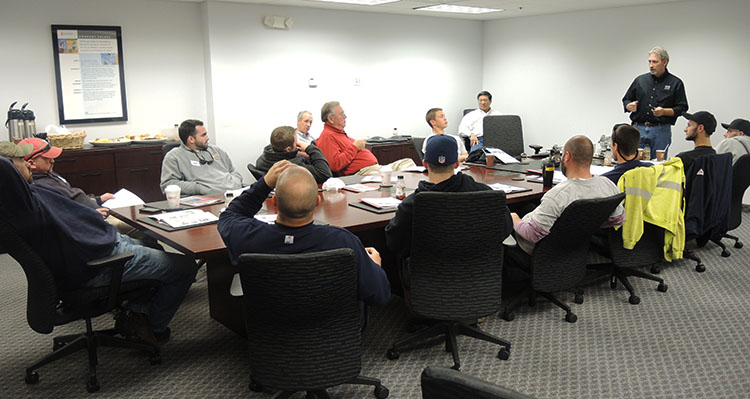 ##SHARELINKS##
|
LEGISLATIVE UPDATE
|
In This Issue:
Congressional Overview
The Congressional Budget Office (CBO) on November 20 reported that the Treasury Department could use "extraordinary measures" to continue federal borrowing until sometime between March and June, well past the February 7 deadline set by the agreement that ended the October government shutdown. The January 15 expiration of FY14 funding under the Continuing Resolution (CR) remains fixed, however. That is also the date on which the second round of sequestration cuts takes effect.
In other news, Commissioner Cheryl LaFleur of the Federal Energy Regulatory Commission (FERC) was named Acting Chairman of the agency on November 25. LaFleur, the first New Englander to sit on the panel in several years, is in the running to be nominated to fill the position permanently.
To read the complete legislative update including the following topics, click the links below:
##SHARELINKS##
|
OPINIONS & EDITORIALS
|
Compliance And Policy Changes
Red Flag Rules
In response to the growing concern over identity theft, the federal government amended the Fair Credit Reporting Act to require creditors to develop and implement an Identity Theft Prevention Program by December 31, 2010. The Red Flags Rule required all organizations that extend credit to consumers, including utilities, to create and implement programs to identify, mitigate and prevent identity theft. In short, you must be reasonably sure that the person applying for service is who he or she says. The program also must be board-approved and included in your policies and procedures.
Dodd-Frank
The financial crisis beginning in 2008 marked the start of the current economic recession and prompted lawmakers to introduce initiatives to stabilize our financial system. This led to the passage of the Dodd-Frank Wall Street Reform and Consumer Protection Act. Although many provisions focus on the financial system, the Act also introduced measures on Risk-Based Pricing and Score Disclosure requirements. If your organization uses a credit score to determine security deposits, you must disclose this and what scoring method you used to the consumer whenever you charge a higher than normal deposit. The requisite language should be added to your Adverse Action notice to ensure compliance.
Social Security Number (SSN) Randomization
Although not regulatory in nature, SSN Randomization dramatically impacts applicant screening and identity verification for utilities. On June 25, 2011, the Social Security Administration implemented this new SSN assignment method to protect the integrity of the SSN and prevent identity theft. This will result in a completely random number. Determining if a SSN has been issued and in which state will be impossible for SSNs issued after June 25, 2011. Only those SSNs that consist of sequential numbers or those with 000, 666, and 900-999 can be identified as invalid/non-issued going forward. This will require more stringent verification methods.
Tips For Addressing Bad Debt
Utilities have also seen an increase in their write-offs recently. While writing off accounts has been viewed as a part of doing business, utilities now realize they must do better managing their bad debt. The difficulty in achieving this is that some don’t do enough during the application process, and lack the knowledge and resources to recover accounts efficiently. The good news is that by following a few best practices you can significantly reduce bad debt.
The application process is the best chance to eliminate bad debt. Recording good identifying information on the applicant makes Red Flag compliance easier and increases the likelihood of recovering the account if it becomes delinquent. It is also important to evaluate the applicant’s creditworthiness using their credit file (no letters of credit!) and charge a deposit based on credit risk. If the account becomes delinquent, this can be used to offset losses or zero the account. The challenges many utilities face lies in bringing together disparate sources of information, synthesizing it, and arriving at consistent deposit decisions throughout the organization.
If an account does become delinquent, the quality of applicant information you gathered will determine how successful collection efforts are, regardless of whether you pursue the debt yourself or use an agency. By validating the applicant’s identity and collecting comprehensive demographic information, you provide the resources that can help recover your bad debt efficiently. When using a third-party, it is important to submit account information quickly and respond to requests for information promptly.
NEPPA does accept articles from our Affiliate Members who want to educate our members on their expertise. If you are thinking about submitting an article to the newsline, please contact Courtney Crouse at ccrouse@neppa.org ##SHARELINKS##
|
PUBLIC POWER WEEK AROUND NEW ENGLAND
|
Hundreds of customers come to the Middleboro G&E administrative office each week to make a payment, signup for service or just to say hello. For this year’s celebration of public ownership, we set up a lobby display that helped them see the light about the newest LED light bulb. We offered an LED bulb exchange, trading one LED bulb for one incandescent bulb used in their homes. We doubled our entries for another raffle this year for two canvas gift bags filled with energy and water saving tools and we handed out hundreds of LED flashlights, jar grippers and pens. Throughout the week, the MEAM-sponsored local video Neighbors Helping Neighbors, celebrating public utility ownership, played in the lobby.
The Display
We had a variety of lamps lit by the virtual evolution of bulbs starting with incandescent, curly CFLs, encapsulated CFLs and a variety of LEDs. Two lamps were plugged into a meter that clearly showed kwh spin for Mr. Edison’s original bulb versus almost indiscernible motion of the dial for the LED equivalent. For the more tactile customers, our 3-lamp stand gave them a chance to feel the heat on the metal bulb shades generated by the differing bulbs, from too-hot-to touch 60-watt to the 11-watt barely warm. A simple mason jar lamp with a clip-on lampshade showed how easily the new LED bulb would fit a standard old-fashioned lamp.
The Exchange
We logged each exchange by customer and address, taking one incandescent bulb and giving one Phillips 11 watt Warm Whit LED bulb per household. Most customers knew about the exchange from our ad and press release and came in bearing a bulb. Some only learned of the exchange when paying their bill and they came back with a bulb. Those who couldn’t make it back but wanted to participate or knew of others were given a rebate form for a $5 credit on their bill when they buy their own Energy Star certified LED. In all, 78 bulbs were exchanged and another 25 rebate slips are in circulation. We now have an impressive variety of clunkier incandescent bulbs for a future historic display.
The Raffle
The prizes were a pair of very fine LandsEnd canvas garden tote bags stuffed with high and low tech devices to save energy and water (saving water is on everyone’s mind due to the impending increase in wastewater costs), including a programmable watering timer, a solar garden spotlight and, of course, an LED bulb. Over 100 customers took the time to fill out a raffle entry card after realizing it was a free give-away. This is double the number of entries for last year’s raffle. It helped that we reminded them that, since there were two identical prizes up for grabs, the odds were far better than a $2 bet on any state lottery. We drew 2 winners after our doors closed on Friday at 5 p.m. Both winners were from Middleboro this year. (Rachel Brown of Pearl St. and Rose May of Thomas St.) By taking these entries, we captured dozens of email addresses for potential use with the Code Red system and phone numbers that need updating.
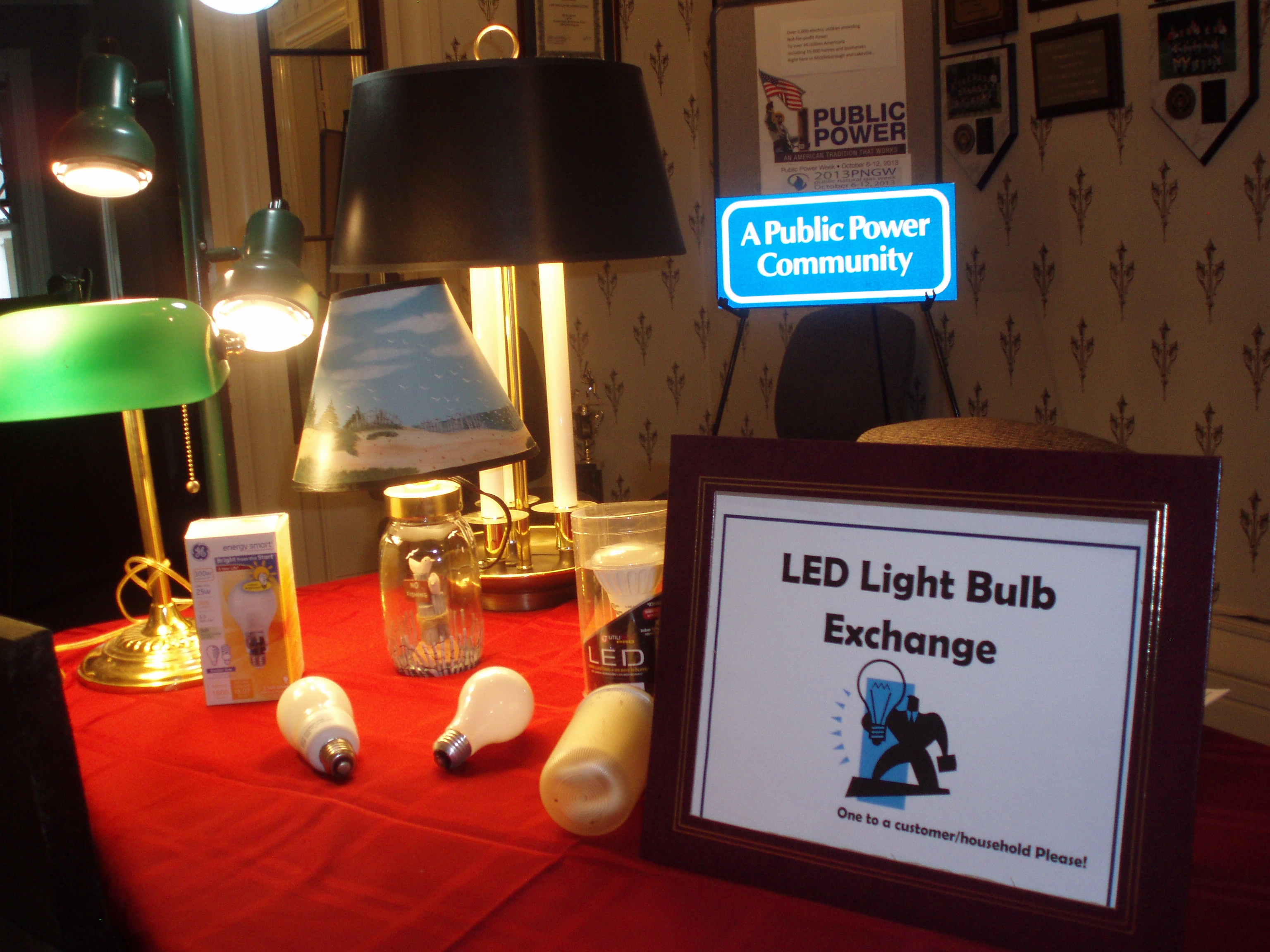 ##SHARELINKS##
|
